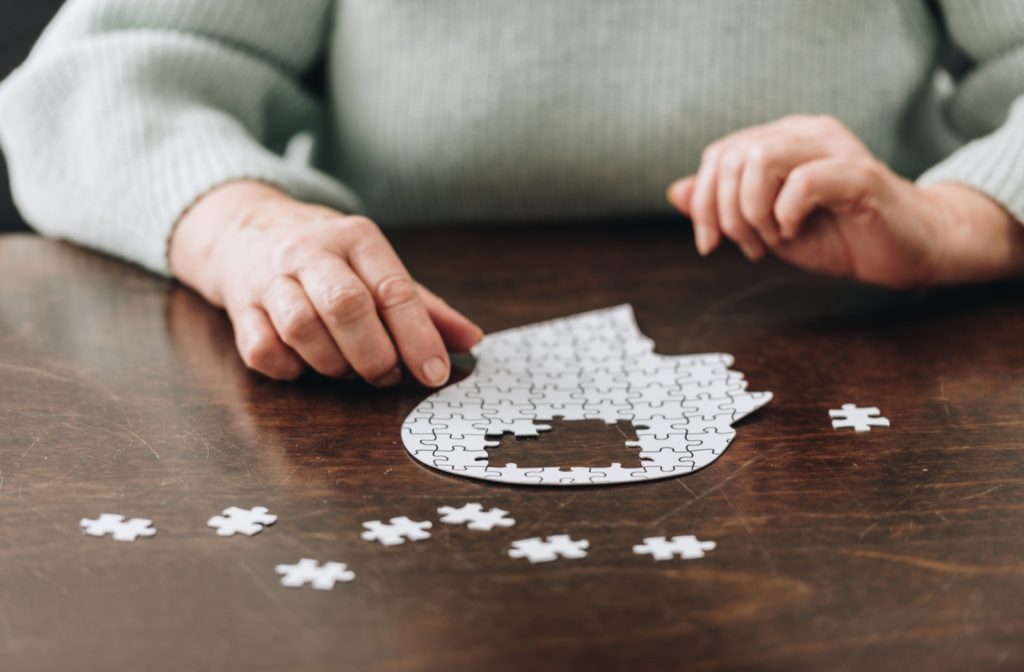Sleep Problems with Dementia
Whether your loved one lives at home, in assisted living, or in another type of senior living community, dealing with dementia requires memory support. One common problem that seniors with memory problems experience is sundowning. Caregivers need the knowledge and training to prevent and cope with sleep problems.
Keep reading to learn more about what causes sundowning and tips for preventing sleep issues.
What Is Sundowning?
Sundowning is a common sleep issue for people with dementia, Alzheimer’s disease, and memory problems. 1 in 5 people with Alzheimer’s experience sundown syndrome. As the name implies, the onset typically comes when the sun goes down. Symptoms tend to get better by morning.
When a senior is sundowning, symptoms can include:
- Agitation or anxiousness
- Restlessness or pacing
- Confusion or disorientation
- Experiencing delusions
- Irritability
- Mood swings
- Suspiciousness or mistrust
What Causes Sundowning?
Medical professionals aren’t entirely sure why sundowning happens. One explanation is that dementia and Alzheimer’s damage the part of the brain responsible for the internal body clock. Although the clock is symbolic, your brain does keep track of when it’s time for sleep and when to stay awake.
Other causes can vary from day to day. For example, they may feel anxious or stressed because of nonverbal cues from their caregiver, essentially mirroring their caregiver’s anxiety. Other possible causes of sundowning include:
- Being overly tired
- Boredom
- Feeling hungry or thirsty
- Depression
- Difficulty separating dreams from reality
- Pain or discomfort
Preventing Sundowning
Caregivers or family can help prevent sundowning. Recognizing triggers, avoiding late-night stimulation, and supporting their internal clock can help reduce the odds of sundown syndrome.
Try these tips for preventing sundowning:
Add night lights. Shadows and darkness can sometimes feel disorientating for seniors with dementia. Adding adequate lighting can help them feel more comfortable and make it easier to recognize that they are in a safe environment.
Avoid late-night caffeine, nicotine, or alcohol. Consuming or using stimulating substances late at night can cause seniors to feel more awake and agitated. Don’t forget to avoid sugar late in the evening late at night, as it provides energy.
Follow a routine. While a regular bedtime routine can help, it’s also helpful to keep their daily activities—including waking up and meals—at normal times.
Limit daytime napping. If seniors get their rest during the day, they’re less likely to feel sleepy at night. However, if they are overly exhausted, caregivers may need to change activities or incorporate rest breaks to help them stay alert during day hours.
Plan sun exposure during the day. Exposure to sunlight during waking hours stimulates seniors to stay awake and encourages nighttime sleepiness. For example, schedule a daily walk in the sunshine or exercise next to a window during poor-weather days. Avoid blue light devices in the evening, such as phones, TV screens, or computers.
Reduce evening stimulation. Sounds, sights, activities—anything that stimulates activity can cause seniors to feel alert rather than sleepy. Some people love falling asleep to the TV. Still, caregivers may need to turn off exciting or loud late-night shows in favor of relaxing music.
Schedule stimulating activities in the morning. Caregivers should schedule appointments, outings, or vigorous-intensity activities earlier in the day (when seniors have the most energy). Avoid leaving personal grooming routines (such as bathing) until late evening, as these activities can be stressful or stimulating. However, if an evening bath helps relax them, note the exception!
Try lighter dinners. Food is fuel, and we need it for energy. Offering a more substantial meal at lunch and a lighter meal in the evening means fueling at the right time. Heavy, late-evening meals can disrupt sleep patterns. Additionally, nutritionists recommend at least 3 hours between supper and bedtime.
Use melatonin. A low dose of melatonin can help induce sleepiness. The human body produces melatonin naturally to promote sleep. But adding more—through diet or supplements—can help seniors whose internal clock isn’t recognizing nighttime is the right time to produce melatonin.
Coping with Sundowning
Preventing sundowning can be challenging, so it’s helpful to have tips for coping. Developing a plan can prepare primary caregivers and family members to reduce anxiety and give their senior loved ones support.
If your loved one is awake and agitated:
- Approach them calmly
- Avoid arguing
- Allow them to move or pace (supervised)
- Do not physically restrain them
- Find out if they need something
- Gently tell them the time
- Reassure them everything is alright
- Try a relaxing activity
Inviting them to relax or participate in a calming activity can help. For example, you may play gentle music, such as nature sounds. Slow music, including classical music, can reduce heart rate, lower blood pressure, and soothe anxiety.
Try to note any triggers that may have caused the behavior. Also, remember anything that helped with relaxation. The more you know about the individual causes, the better you can prepare for next time.
Rest Easier with Memory Support
Seniors with dementia or other cognitive challenges deserve a home where they can rest easier. Tylers Mill in Deptford offers personalized memory support to promote health and happiness. Our community can help seniors feel at home.
When your loved one is experiencing sundowning or other behavior changes, we can help them feel safe and comfortable. Schedule a visit or contact us today to learn more about our welcoming community!



